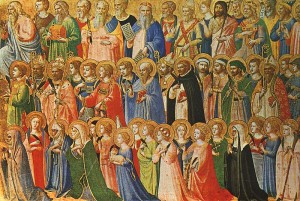By The Rt. Rev. Paul Hewett
Saturday, November 1, is All  Saints’s Day, when we remember all the saints in the Church who are not named on her calendars, but are known to God to be saints. Many parishes will celebrate All Saints´s Day this year on Sunday, November 2, for maximum participation. Cranmer’s Collect for this Day is a typical masterpiece: O Almighty God, who hast knit together thine elect in one communion and fellowship, in the mystical body of thy Son Christ our Lord; Grant us grace so to follow thy blessed Saints in all virtuous and godly living, that we may come to those unspeakable joys which thou hast prepared for those who unfeignedly love thee; through the same thy Son Jesus Christ our Lord. Amen.”
Saints’s Day, when we remember all the saints in the Church who are not named on her calendars, but are known to God to be saints. Many parishes will celebrate All Saints´s Day this year on Sunday, November 2, for maximum participation. Cranmer’s Collect for this Day is a typical masterpiece: O Almighty God, who hast knit together thine elect in one communion and fellowship, in the mystical body of thy Son Christ our Lord; Grant us grace so to follow thy blessed Saints in all virtuous and godly living, that we may come to those unspeakable joys which thou hast prepared for those who unfeignedly love thee; through the same thy Son Jesus Christ our Lord. Amen.”
All Saints’ Day is vitally important because it is the Church’s job to produce saints. Our goal is to produce saints, not strategies. Holiness of life for us all is the vital element in attracting people into the Church. No number of brilliant strategies for Church growth will work without us growing in our capacity to love God, and one-another-in-God. Holiness is one of the most exciting things in the world. There are few things more exciting than learning about the saints and the examples they give us, and holding them up as heroes and heroines of the Faith, and role models.
But the saints give us even more than their examples. They pray for us. “We also are compassed about with so great a cloud of witnesses…” (Hebrews 12: 1) We can ask for their prayers, because we are knit together in one communion and fellowship with them. The Body of Christ is an organic whole, through time and space, and all its members, living and departed, are together in the fellowship of the Holy Spirit. We celebrate this in the Eucharist when we say, or sing, “therefore, with Angels and Archangels, and with all the company of heaven, we laud and magnify thy glorious Name…” Just as we ask for the prayers of a Christian friend at Church, we can ask for the prayers of a saint, a patron, or a favorite saint. The saint whose prayers we most ask for is our Lord´s Mother, who is also our Mother, and we regard her intercession as priceless. When asked about all this, C. S. Lewis once said (paraphrasing him) that “if you´re in a hurry, go straight to the top; but if you have some time, by all means ask for the prayers of a saint.” We are in a dynamic rapport with these members of the Body, and sometimes, living in the South, one hears the phrase, “there (or just then), the veil was very thin.” Father Schmemann used to say that when we sing the Sanctus, “we are hearing and seeing heaven.” In the Eucharist, we are in heaven (literally), ascended with our Lord in the Spirit, to sup with Him in the glory of the new creation, before the heavenly Father´s Throne.
All-Saints
We see from our Lord’s example how he talked to the saints. In his Transfiguration, he was talking with Moses and Elijah (Luke 9: 28-36) about his decease…his great exodus, from death to life. And in the parable of Dives and Lazarus, Dives (albeit in hell) has a conversation with Abraham. Does Article XXII in the Articles of Religion put a brake on all this? That Article would not come against the understanding of the universal Church from the earliest days, of the communion of saints, but against medieval abuses of it.
The day after All Saints’ Day is All Souls’ Day, when we pray for our departed loved ones, most of whom died as saints only in the generic sense of the word. Most of us die with some “unfinished business,” or unresolved issues. When we check in to the heavenly regions, we may be asked, before going into the unbearable brilliance of the banquet hall, to step into a wash room to tidy up, brush our teeth, comb our hair, straighten a neck tie, and clean our shoes, and perhaps get a pair of sun glasses for the next phase, and go over to so-and-so and finally make up.
In the 1928 Book of Common Prayer, prayer for the dead was re-introduced, in the Burial Office, and in the Eucharistic Liturgy. In the Prayer for the whole state (living and departed) of Christ´s Church, on p. 74, at the bottom, the phrase “beseeching thee to grant them (the departed) continual growth in thy love and service” was inserted. The theme of these prayers tends to be that of growth, as on p. 598, that the deceased is received “more and more into thy joyful service, that he may win with thee and thy servants everywhere, the eternal victory…”